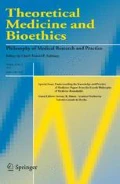Abstract
Health care has increasingly come to be understood as a commodity. The ethical implications of such an understanding are significant. The author argues that health care is not a commodity because health care (1) is non-proprietary, (2) serves the needs of persons who, as patients, are uniquely vulnerable, (3) essentially involves a special human relationship which ought not be bought or sold, (4) helps to define what is meant by ‘necessity’ and cannot be considered a commodity when subjected to rigorous conceptual analysis. The Oslerian conception that medicine is a calling and not a business ought to be reaffirmed by both the profession and the public. Such a conception would have significant ramifications for patient care and health care policy.
Similar content being viewed by others
References
Lakoff G, Johnson M.Metaphors We Live By. Chicago: University of Chicago Press, 1980.
Sontag S.Illness As Metaphor. New York: Vintage, 1979.
Sulmasy DP. By whose authority? Emerging issues in medical ethics.Theological Studies 1989;50:95–119.
President's Commission for the Study of Ethical Problems in Medicine and Biomedical Research.Securing Access to Health Care: The Ethical Implications of Differences in the Availability of Health Services, Vol 1. Washington, DC: U.S. Government Printing Office, 1983.
Plato.Republic. [Grube GMA, transl]. Indianapolis: Indiana: Hackett, 1974.
Reinhardt UE, Relman AS. For-profit health care.Health Affairs 1986;5:5–31.
Agich GJ. Medicine as business and profession.Theor Med 1990;11:311–324.
Engelhardt HT, Rie MA. Morality for the medical-industrial complex.N Engl J. Med 1988;316:1086–89.
Osler WJ. The master word in medicine. In:Aequanimitas, With Other Addresses to Physicians, Nurses, and Other Practitioners of Medicine. 3rd ed. Philadelphia: Blakiston, 1932:348–71.
Eliade M.Shamanism. New York: Pantheon Books, 1964:301–2.
Gelfand M.Witch Doctor. London: Harvill Press, 1964:86–93.
Rogers Sl.The Shaman: His Symbols and His Healing Power. Springfield, Illinois: Charles C. Thomas, 1982:27–34.
Dougherty CJ. The costs of commercial medicine.Theor Med 1990;11:275–86.
Dyer AR. Professional organization of physicians: balancing the cost-quality equation.Theor Med 1989;10:185–93.
Auld DA, Bannock G, Baxter RE, Rees R.The American Dictionary of Economics. New York: Facts on File, 1983.
Pellegrino ED. Altruism, self-interest, and medical ethics.JAMA 1987; 258: 1939–40.
Fleck LM. Just health care (I): is beneficence enough?Theor Med 1989;10:167–82.
Eschenbach K, Woodward RS. Medicine as a career: choices and consequences.Theor Med 1989;10:217–29.
Edelstein L. The Hippocratic physician. In: Temkin O, Temkin CL, eds.Ancient Medicine. Baltimore: Johns Hopkins University Press, 1967:87–110.
Kudlein F. Medicine as a “liberal art” and the question of the physician's income.Journal of the History of Medicine and Allied Sciences 1976;31:448–59.
Temkin O. Medical ethics and honoraria in late antiquity. In: Rosenberg CE, ed.Healing and History, New York: Science History Press, 1979:6–26.
Starr P.The Social Transformation of American Medicine. New York: Basic Books, 1982:61–2.
Cassell E. The function of medicine.Hastings Cent Rep December 1977;7:16–9.
Pellegrino ED, Thomasma DC.For the Patient's Good: The Restoration of Beneficence in Health Care. New York: Oxford University Press, 1988.
Ramsey P.The Patient As Person. New Haven, Connecticut: Yale University Press, 1970.
Sulmasy DP. The covenant within the covenant: doctors and patients in Sirach 38:1–15.Linacre Quarterly 1988;55:14–24.
Suchman AL, Matthews DA. What makes the doctor-patient relationship therapeutic?Ann Intern Med 1988;108:125–30.
American College of Physicians Ethics Manual, Part 1. History; the patient; other physicians.Ann Intern Med 1989;111:245–52.
Peabody FW. The care of the patient.JAMA 1927;88:877–82.
Daniels N.Just Health Care. London: Cambridge University Press, 1985.
Fleck LM. DRGs: justice and the invisible rationing of health care resources.J Med Phil 1987;12:165–96.
Fleck LM. Just health care (II): is equality too much?Theor Med 1989;10:301–10.
Daniels N.Am I My Parents' Keeper? New York: Oxford University Press, 1988.
Aristotle.Metaphysics. [Apostle HG, transl]. Grinnell, Iowa: The Peripatetic Press, 1979.
Engelhardt HT.The Foundations of Bioethics. New York: Oxford University Press, 1986:36;356;362–3.
Campbell CS. Religion and moral meaning in bioethics.Hastings Cent Rep July/August 1990;20(Suppl):4–10.
Brody B. Justice and competitive markets.J Med Phil 1987;12:37–50.
Enthoven A, Kranick R. A consumer choice health plan for the 1990s. Universal health insurance in system designed to promote equality and economy.N Engl J Med 1989;320:29–37;94–101.
Halper T. DRGs and the idea of a just price.J Med Phil 1987;12:155–64.
Bagley CE. Prospective payment and medical ethics.J Med Phil 1987;12:107–22.
Mooney G. The demand for effectiveness, efficiency, and equity of health care.Theor Med 1989;10:195–205.
Menzel PT.Strong Medicine: The Ethical Rationing of Health Care. New York: Oxford University Press, 1990:37–56.
Rainbolt GW. Competition and the patient-centered ethic.J Med Phil 1987;12:85–99.
Cicero. De Officiis. [Miller W, transl]. Vol XXI ofThe Loeb Classical Library. Cambridge, Massachusetts: Harvard University Press, 1975.
Sokolowski R. The art and science of medicine. In Pellegrino ED, Langan J, Harvey JC eds.Catholic Perspectives on Medical Morals. Dordrecht: Kluwer, 1989:263–75.
Flexner A.Medical Education in the United States and Canada. Boston: Merrymount, 1910.
Brock DW, Buchanan AE. The profit motive in medicine.J Med Phil 1987;12:1–35.
Hsiao WC, Braun P, Dunn D, Becker ER, DeNicola M, Ketcham TR. Results and policy implications of the resource-based relative value study.N Engl J Med 1988;319:881–8.
Curzer H. Do physicians make too much money?Theor Med. 1992;13:43–63.
Author information
Authors and Affiliations
Rights and permissions
About this article
Cite this article
Sulmasy, D.P. What's so special about medicine?. Theoretical Medicine 14, 27–42 (1993). https://doi.org/10.1007/BF00993986
Issue Date:
DOI: https://doi.org/10.1007/BF00993986




